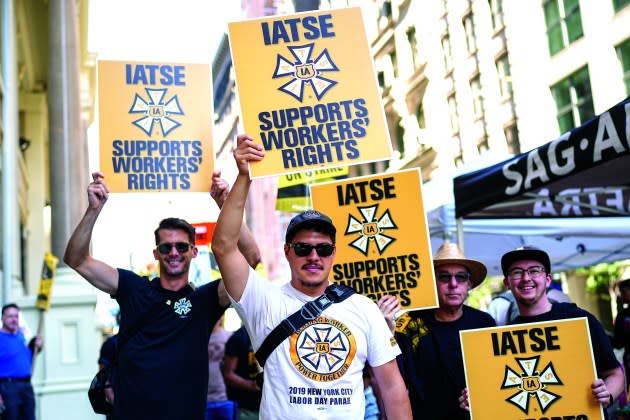Hollywood’s Labor Peace May Be Temporary, as IATSE and Teamsters Gear Up for a Fight
- Oops!Something went wrong.Please try again later.

Writers returned to work two months ago, and the SAG-AFTRA strike has been over for nearly a month. Production has restarted but won’t be back to full strength until mid-January.
But even as Hollywood tries to return to normal, dark clouds are forming on the horizon. The International Alliance of Theatrical Stage Employees contract expires on July 31, as does the Basic Crafts contract, which covers the Teamsters.
More from Variety
In a period of rising union militancy across industries, it’s not clear whether the Hollywood studios have achieved lasting labor peace or just a temporary truce.
“We’re going to be demanding things we believe members deserve for the work they do,” says Lindsay Dougherty, secretary-treasurer of Teamsters Local 399. “We have to fix this stuff. Our members make Hollywood move.”
Both the studios and the below-the-line workforce — camera operators, lighting technicians, makeup artists and so on — have taken a hit in 2023. That figures to be a factor on both sides heading into the 2024 negotiations.
How much more pain can they endure?
“We were so financially devastated,” says Barry Caldwell, a veteran script supervisor. “My fear is we won’t have the resolve nor the financial ability to strike.”
Caldwell last worked on “The Lincoln Lawyer,” which wrapped in March. Since then, he’s chewed through his savings, fallen behind on bills and had to withdraw 20% from his retirement account. His family got by on disability checks and the proceeds from the sale of property that he and his siblings inherited from his mother.
His retirement savings were depleted during the pandemic, when the motion picture retirement plan allowed members to take out 20% in “hardship” withdrawals.
“I’m eight years from retirement,” Caldwell tells Variety. “I have no money in the bank, and my pension has been chopped 40% thanks to this and COVID.”
Some workers saw the strike coming and had money saved up. But the six-month stoppage — between the Writers Guild of America and SAG-AFTRA strikes — was longer than many anticipated.
Given the slowdown before the strikes, and the time needed to ramp up to full production, many workers will have been without work for a full year.
“I do wonder what people’s appetites are,” says Amy Duddleston, a veteran TV and film editor. “But we have to get the things we need out of this next contract. And if that means signing a strike authorization, then I will do it.”
Dougherty says her union will seek at least 7% raises in the first contract year to account for inflation, plus protection against drivers being replaced by self-driving trucks. She is starting to prepare the membership for a tough fight.
“At this point everybody wants to go back to work,” she says. “The message is going to be to save your money and enforce your contract.”
IATSE is expected to begin its negotiations in March. The union represents editors, lighting technicians, makeup artists and many other below-the-line workers.
“We will fight aggressively at the table to achieve a contract that reflects our members’ priorities and their invaluable contributions to the success of the entertainment industry,” a spokesperson for IATSE International said in a statement.
The union has never gone on an industrywide strike — though it came close two years ago.
The writers and actors strikes led to contract gains that were not on the table when either strike began. Some feel the below-the-line unions also will have to strike to get the terms they want.
“Strikes work. They hurt but they work,” says Dejon Ellis Jr., the business manager of IATSE Local 80. “Labor peace has gone to shit. The employer is making unions pull this trigger. For the last five years or so, it seems like for union members to get what they want, we have to hit the streets.”
The studios also suffered damage from the strikes, though how much is up for debate.
Kevin Klowden, chief global strategist at the Milken Institute, has estimated the damage to the overall economy at $7 billion, including lost wages and the ripple effect on ancillary businesses.
Others believe that figure is overstated. Christopher Thornberg, founding partner of Beacon Economics, argued in a report that the impact on both the studios and the economy amounted to “not much.”
“It wasn’t that big a deal,” Thornberg says. “You try to find one data point that suggests there was any macroeconomic harm. You won’t find it.”
The studios were forced to delay a slew of major theatrical releases — including “Captain America: Brave New World” and “Snow White” — from 2024 to 2025. The delays represent at least $1.7 billion in North American box office revenues, estimates Eric Handler, senior research analyst at Roth MKM.
“It’s not permanently lost,” Handler says. “It’s just shifted from one year to another year.”
It may take a year or more to get an accurate read on the strikes’ impact on the studios.
Among the workers, the struggles of 2023 have also built solidarity, says Shiran Amir, who helped create a hardship fund for editors.
“We’re all fired up,” she said. “The collective conclusion is we deserve a fair contract no matter what, and we are going to fight however we can to get that.”
Best of Variety
Sign up for Variety’s Newsletter. For the latest news, follow us on Facebook, Twitter, and Instagram.
